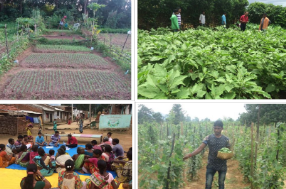CSR’s Role in Sustainable Indian Agriculture
India has been a pioneer in Corporate Social Responsibility (CSR) since 2013. The Companies Act mandates CSR contributions, impacting social development. Over Rs 1.84 lakh crore has been disbursed from 2014 to 2023. Agriculture, vital for the economy and employment, faces challenges like climate change and stagnant incomes. CSR can play an important role in addressing these issues.
Importance of Agriculture in India
Nearly 47% of India’s population relies on agriculture for their livelihoods. The agricultural sector contributes 16.73% to the GDP. This puts stress on its significance in shaping the socio-economic landscape. The Green Revolution improved productivity, but new challenges have emerged, necessitating a focus on sustainability.
CSR Contributions to Agriculture
Recent trends show corporate entities are prioritizing environmental sustainability in their CSR budgets. A report revealed that 23% of companies identified “environment and sustainability” as a key area. The 2024-2025 agriculture budget of Rs 1.52 lakh crore emphasizes productivity and resilience. However, government funding often falls short, creating opportunities for CSR involvement.
Key CSR Activities in Agriculture
CSR initiatives can support agriculture through various projects. These include establishing grain banks, farmer schools, and livelihood projects. Water conservation and energy-efficient irrigation are also crucial. Such activities align with the shift towards sustainable agricultural practices.
A important challenge is the lack of transparency in funding for agricultural initiatives. Current reporting mechanisms do not effectively categorise agricultural CSR activities. Unlike healthcare and education, which have clear allocations, agriculture-related initiatives are harder to track. This limits the assessment of their impact.
Defining Agricultural CSR Sectors
The Need for Improved Reporting Frameworks
To enhance CSR’s impact on agriculture, a distinct reporting framework is necessary. This would streamline fund allocation and ensure transparency. Identifying specific sustainability issues in agroecosystems can guide funding towards pressing needs. Both hard and soft infrastructure development is essential for meaningful change.
A reformed reporting framework will enhance accountability and transparency. It can direct funds more effectively towards agricultural sustainability. This approach will benefit production systems and contribute to sustainable growth. Focusing on agriculture within CSR can drive important improvements in the sector.
#Minerals
#Geology
#CrystalScience
#EarthScience
#RockFormation
#MineralIdentification
#Silicates
#Gemstones
#NaturalResources
#MineralCollection
World Cell Biologist Awards:
The Companies Act allows CSR funds to be allocated across 29 sectors. Eleven sectors relate directly to agricultural sustainability. These include gender equality, agroforestry, and rural development. However, many activities within these sectors are not agriculture-specific, complicating funding tracking.
The Need for Improved Reporting Frameworks
To enhance CSR’s impact on agriculture, a distinct reporting framework is necessary. This would streamline fund allocation and ensure transparency. Identifying specific sustainability issues in agroecosystems can guide funding towards pressing needs. Both hard and soft infrastructure development is essential for meaningful change.
A reformed reporting framework will enhance accountability and transparency. It can direct funds more effectively towards agricultural sustainability. This approach will benefit production systems and contribute to sustainable growth. Focusing on agriculture within CSR can drive important improvements in the sector.
#Minerals
#Geology
#CrystalScience
#EarthScience
#RockFormation
#MineralIdentification
#Silicates
#Gemstones
#NaturalResources
#MineralCollection
World Cell Biologist Awards:
Website Link : cellbiologist.org
Nomination Link : cellbiologist.org/award-nomination/?ecategory=Awards&rcategory=Awardee Contact Us: contact@cellbiologist.org
Follow Us On :
Twitter : twitter.com/account/access
Blogger : blogger.com/u/1/blog/posts/1155994660171864058
Pinterest :pinterest.com/researchs625/?actingBusinessId=907757006050531250
Linkedin : .linkedin.com/in/research-scholar-10278a323/
Tumblr ; tumblr.com/




Comments
Post a Comment